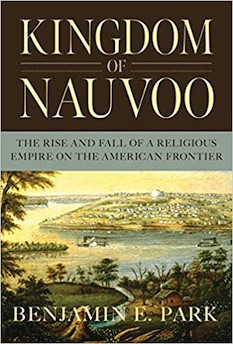By Louis J. Kern
In 1834 preeminent evangelist Charles Grandison Finney declared, “the Church must take right ground in regard to politics . . . . Politics are a part of religion in such a country as this, and Christians must do their duty to the country as a part of their duty to God” (Lectures on Revivals of Religion, XV, 1835).
Park’s work, a critical revisionist history of the Mormon settlement of Nauvoo, Illinois, (1839-44) is grounded in primary documentary sources published by the Church of Jesus Christ of Later-day Saints (LDS) in 2016-17. Like evangelicals of the Second Great Awakening, Mormons decried moral declension, sought to restore primitive Christianity, and favored increased religious participation by women and their involvement in moral reform. Unlike other evangelicals, they sustained Old Testament as opposed to New Testament ideals, asserted an ongoing revelatory tradition, prioritized group salvation, and established hierarchical government.
From the mid-1830s Mormons posed problems both for religious and secular reasons. In Kirtland, Ohio, they printed their own currency illegally, and its collapse led to their expulsion. Their missionary impulse towards the Native Americans (believed to be lost remnants of Israelites) caused distrust in frontier communities seeking expansion at their expense.
Driven from Missouri (1838) by a violent vigilante mob, LDS sought refuge in Illinois. As a persecuted religious minority, they established protective institutions providing the framework of an autonomous, theocratic state embodying Finney’s call to religious involvement in politics. Mormons became the first group to formalize bloc voting to secure minority religious protection; opponents considered this violative of American individualism.
Dissatisfied with democratic politics, Joseph Smith declared the unlimited sovereignty of Nauvoo, creating “one of the most radical political organizations in nineteenth century America”—“the Kingdom”—a theocracy under the prophet (Smith) and the Mormon priesthood that would replace the decadent, immoral, un-Christian democracy of the U.S. A new constitution was drafted to replace the federal one. At the same time, Smith declared himself a candidate for the U.S. Presidency (1844), and the LDS pursued territorial settlement or a dedicated reservation outside the U.S.—Texas, Oregon, and California, even proposing a joint refuge with other despised groups—Catholics, Jews, and Muslims.
Simultaneously, social relations in Nauvoo were complicated by the introduction of polygamy in 1841. Initially secret, it was formalized by two of Smith’s revelations (1842-43) and increasingly became a problem for the community, especially after the exposés of excommunicated John C. Bennett. Increasingly, Illinoisans feared the Mormons as undemocratic, immoral, and un-American; mob violence accelerated, and Joseph and Hiram Smith were murdered. The LDS agreed to leave Illinois within a year and ultimately found haven outside the U.S. in the Great Salt Lake Basin (Utah).
Largely due to polygamy, persecution continued in federal legislation outlawing the practice; in 1857 a military confrontation, the abortive-Mormon War, occurred. Park notes the power of women in Mormon life, noting that Utah was the first state to grant female suffrage, but on the whole female power for women remained largely domestic and moral.
This is a timely book, providing essential historical context for contemporary political activities of the evangelical Christian Right in its strict adherence to the Republican Party, its quest to infuse government with Christian values, and to prioritize the ideals of a faith-based minority over those of the majority of Americans. While the Mormon attempt to breach the wall between church and state through assertive freedom of religion failed, modern evangelicals have found sympathetic response from political allies (DOMA, 1996) and courts (Burwell v. Hobby Lobby, 2014). Less potent religious groups like Native Americans practicing peyote rituals have experienced official discrimination. The separation of church and state remains a perilously fraught territory.
Louis J. Kern (ΦBK, Clark University) is professor emeritus of history at Hofstra University. Hofstra University is home to the Omega of New York chapter of Phi Beta Kappa.




